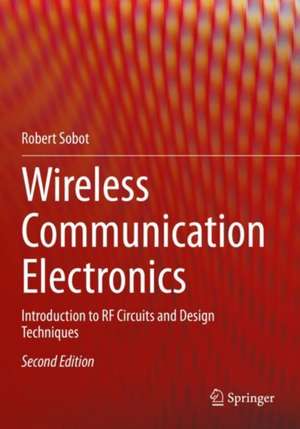Wireless Communication Electronics: Introduction to RF Circuits and Design Techniques
Autor Robert Soboten Limba Engleză Paperback – 25 sep 2021
- Offers readers a complete, self-sufficient tutorial style textbook;
- Includes all relevant topics required to study and design an RF receiver in a consistent, coherent way with appropriate depth for a one-semester course;
- The labs and the book chapters are synchronized throughout a 13-week semester so that the students first study each sub-circuit and the related theory in class, practice problems, work out design details and then build and test the sub-circuit in the lab, before moving onto the next chapter;
- Includes detailed derivations of all key equations related to new concepts.
| Toate formatele și edițiile | Preț | Express |
|---|---|---|
| Paperback (2) | 582.08 lei 43-57 zile | |
| Springer – 23 aug 2016 | 582.08 lei 43-57 zile | |
| Springer International Publishing – 25 sep 2021 | 590.26 lei 43-57 zile | |
| Hardback (1) | 737.04 lei 43-57 zile | |
| Springer International Publishing – 24 sep 2020 | 737.04 lei 43-57 zile |
Preț: 590.26 lei
Preț vechi: 694.42 lei
-15% Nou
112.96€ • 117.34$ • 93.83£
Carte tipărită la comandă
Livrare economică 03-17 februarie 25
Specificații
ISBN-10: 303048632X
Pagini: 522
Ilustrații: XX, 522 p. 364 illus., 287 illus. in color.
Dimensiuni: 178 x 254 mm
Greutate: 0.93 kg
Ediția:2nd ed. 2021
Editura: Springer International Publishing
Colecția Springer
Locul publicării:Cham, Switzerland
Cuprins
Part I.Basic concepts and definitions.- Chapter 1. Introduction.- Chapter 2.Basic behavioral and device models.- Chapter 3. Multistage Interface.- Chapter 4. Basic Semiconductor Devices.- Chapter 5. Transistor Biasing.- Chapter 6. Review of Basic Amplifiers.- Chapter 7. Introduction to frequency analysis of amplifiers.- Chapter 8. Electrical Noise.- Part II. Radio receiver circuit.- Chapter 9. Radio receiver architecture.- Chapter 10. Electrical Resonance.- Chapter 11. Matching Networks.- Chapter 12. RF and IF Amplifiers.- Chapter 13. Sinusoidal Oscillators.- Chapter 14. Frequency Shifting.- Chapter 15. Modulation.- Chapter 16. AM and FM Signal Demodulation.- Chapter 17. RF Receivers.
Notă biografică
Robert Sobot received the B.Sc. degree in engineering physics from the University of Belgrade, ex-Yugoslavia, in 1989, and the M.A.Sc. and the Ph.D. degrees in electrical engineering from Simon Fraser University, Canada, in 1996 and 2005 respectively. In September 2014 he joined ENSEA in France as a Full Professor. From 2006 to 2015 he was with Western University in Canada as an Associate Professor, now he is an Adjunct Professor. From 1996 to 2001 he was with PMC-Sierra Inc., Canada, where he was leading projects in analog IC design. During 2012/14 he was invited researcher at the University Pierre et Marie Curie at Sorbonne (LiP6), Paris, France. Since 2010 he authored two textbooks on the topic of Wireless Communication Electronics, and he established the Implantable System Laboratory (ISL) at Western University in Canada that is dedicated to research related to wireless implantable telemetry systems.
Textul de pe ultima copertă
This book is intended for senior undergraduate and graduate students as well as practicing engineers who are involved in design and analysis of radio frequency (RF) circuits. Detailed tutorials are included on all major topics required to understand fundamental principles behind both the main sub-circuits required to design an RF transceiver and the whole communication system. Starting with review of fundamental principles in electromagnetic (EM) transmission and signal propagation, through detailed practical analysis of RF amplifier, mixer, modulator, demodulator, and oscillator circuit topologies, all the way to the basic system communication theory behind the RF transceiver operation, this book systematically covers all relevant aspects in a way that is suitable for a single semester university level course.
- Offers readers a complete, self-sufficient tutorial style textbook;
- Includes all relevant topics required to study and design an RF receiver in a consistent, coherent way with appropriate depth for a one-semester course;
- The labs and the book chapters are synchronized throughout a 13-week semester so that the students first study each sub-circuit and the related theory in class, practice problems, work out design details and then build and test the sub-circuit in the lab, before moving onto the next chapter;
- Includes detailed derivations of all key equations related to new concepts.
Caracteristici
Includes all relevant topics required to study and design an RF receiver in a consistent, coherent way with appropriate depth for a one-semester course;
The labs and the book chapters are synchronized throughout a 13-week semester so that the students first study each sub-circuit and the related theory in class, practice problems, work out design details and then build and test the sub-circuit in the lab, before moving onto the next chapter;
Includes detailed derivations of all key equations related to new concepts.
Descriere
This book is intended for senior undergraduate and graduate students as well as practicing engineers who are involved in design and analysis of radio frequency (RF) circuits. Detailed tutorials are included on all major topics required to understand fundamental principles behind both the main sub-circuits required to design an RF transceiver and the whole communication system. Starting with review of fundamental principles in electromagnetic (EM) transmission and signal propagation, through detailed practical analysis of RF amplifier, mixer, modulator, demodulator, and oscillator circuit topologies, all the way to the basic system communication theory behind the RF transceiver operation, this book systematically covers all relevant aspects in a way that is suitable for a single semester university level course.
- Offers readers a complete, self-sufficient tutorial style textbook;
- Includes all relevant topics required to study and design an RF receiver in a consistent, coherent way with appropriate depth for a one-semester course;
- The labs and the book chapters are synchronized throughout a 13-week semester so that the students first study each sub-circuit and the related theory in class, practice problems, work out design details and then build and test the sub-circuit in the lab, before moving onto the next chapter;
- Includes detailed derivations of all key equations related to new concepts.
